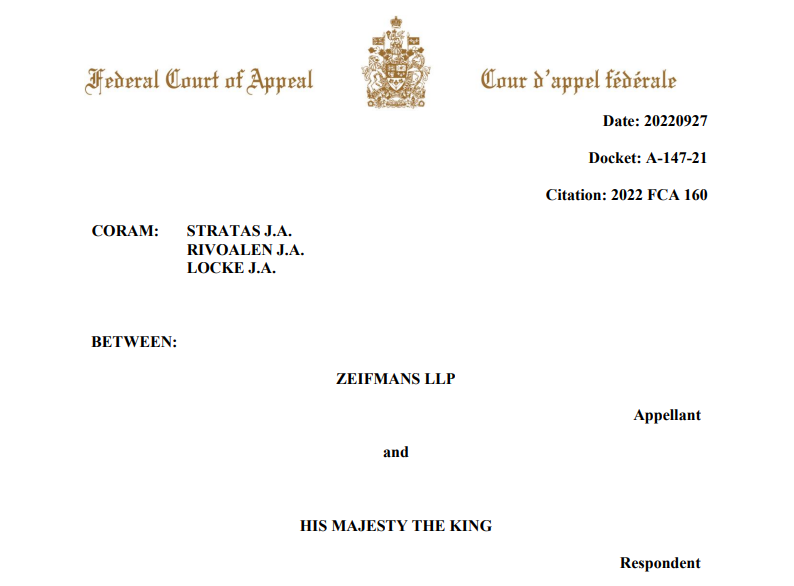CRA’s Power over Accounting Firms on Display in Zeifmans LLP v. Canada (National Revenue)
The CRA’s broad powers to compel accounting firms to turn over information and documentation pertaining to their clients were recently on display in the case of Zeifmans LLP v. Canada (National Revenue).[1] This case should remind all accounting firms of the need to prepare in advance for a Requirement for Information (RFI) from CRA. In this article, I summarize Zeifmans and recommend four actions your firm can take to mitigate the potential damage of an RFI.
Zeifmans
Zeifmans is a tax and accounting firm based out of Toronto. For several years, CRA had been auditing members of a family that were the clients of Zeifmans’. Eventually, the CRA issued an RFI to Zeifmans for information and documentation relating to the family members and all “entities owned, operated, controlled or otherwise connected to [them]”.[2]
Zeifmans challenged CRA’s authority to issue the RFI on several bases. But the Federal Court of Appeal ultimately ruled that CRA had acted within its broad authority granted by section 231.2 of the ITA.
How to Prepare in Advance
Section 231.2 empowers CRA to require “any person” to provide “any information” or “any document”. CRA’s policy document, Acquiring Information from Taxpayers, Registrants and Third Parties,[3] states that “[a]ccountants’ and auditors’ working papers… may be necessary, although not routinely required, in the determination of a taxpayer’s liabilities and entitlement.”[4]
As such, accounting firms must prepare for the eventuality that CRA will one day send an RFI for one of their clients.
1. Inform your clients
Many clients wrongly assume that the information and documentation they provide to their accountant is confidential. Accounting firms should take pro-active steps to explain CRA’s power to override an accountant’s duty of confidentiality.
Consider including a sentence in your engagement letter that alerts clients to CRA’s powers under 231.2 or making RFIs the subject of your firm’s next blog post.
No accountant wants to be alarmist but providing this information in advance will prevent you from appearing flat-footed if CRA ever issues you an RFI.
2. Adopt an internal policy for handling RFIs
Accounting firms should have internal policies for when they receive an RFI. Which members of the firm will be informed? How will the client be notified? And how will the firm determine which of the client’s documents it must turnover?
Under section 238, CRA is empowered to levy penalties against people who do not meet the requirements of an RFI. But accounting firms still have obligations to their clients not to turn over documents that they are not legally obliged to disclose. Do not leave it to chance that everyone in your firm will handle an RFI in a manner consistent with the firm’s legal obligations.
3. Ensure the RFI does not overstep CRA’s authority
CRA’s power under 231.2 is broad but not limitless. For example, CRA cannot use 231.2 as part of a “fishing expedition” or a vexatious audit; they cannot use RFIs when the predominant purpose of their investigation is criminal prosecution; there are heightened requirements on CRA if the RFI is for information on “unnamed persons”; and an RFI does not supersede solicitor-client privilege. If you believe the RFI exceeds CRA’s authority, obtain legal advice on how to respond.
4. Leverage solicitor-client privilege
Solicitor-client privilege protects communications and documentation exchanged between lawyers and anyone seeking legal advice. Since Canadians do not have solicitor-client privilege with their accountants (and many scholars think they should), accountants must be alert to opportunities where involving a lawyer could add a valuable layer of protection for the client.
Enlisting a tax dispute lawyer to assist with an audit, objection, or voluntary disclosure, for example, can envelope all communications between the lawyer, the client, and the accountant in the client’s solicitor-client privilege with the lawyer.
Solicitor-client privilege, however, only protects communications with a lawyer that pertain to legal advice. In Canada (National Revenue) v. Atlas Tube Canada ULC,[5] the corporate client was forced to disclose a report it received from its lawyer that flagged its own tax exposure. The court held that, because the primary purpose of the lawyer’s report was to give business advice on whether to proceed with the acquisition, instead of legal advice, the report was not subject to solicitor-client privilege.
Conclusion
Confidentiality is a hallmark of the service that accountants provide their clients. An RFI that blindsides your firm or your client will undermine the hard-earned perception of your firm as a trusted and stalwart advisor. Mitigate this risk by educating your clients up front and taking steps to reduce their exposure.
[1] 2022 FCA 160 [“Zeifmans”]
[2] Zeifmans LLP v. Canada (National Revenue), 2021 FC 363, at para 3.
[3] CRA Investigations Manual, June 2010 [“CRA Investigations Manual”].
[4] CRA Investigations Manual at page 4.
[5] 2018 FC 1086.


